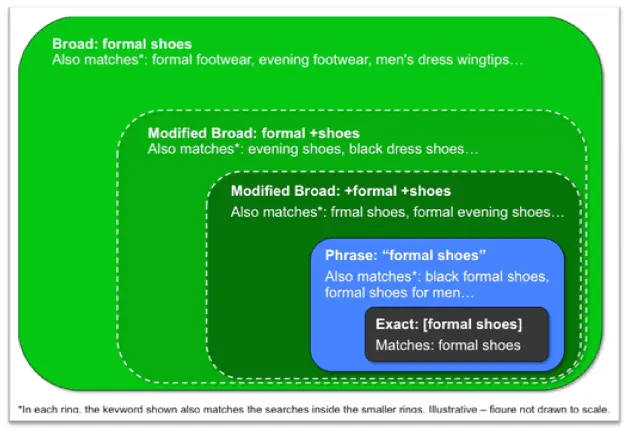You would agree that choosing the right set of keywords is one of the most crucial steps of search engine marketing. No matter whether it is organic search marketing or pay-per-click marketing, the keywords you chose have the potential to make or mar your strategies. Especially in the case of Pay Per Click Advertising, it becomes even more crucial. The reason is obviously the fact that you pay for every click in PPC advertising, and hence you need relevant keywords and better control on them.
Thankfully with AdWords, we have several effective techniques which allow us to choose and fine-tune our keywords exactly according to our advertising goals. Once we are done analyzing keywords, making final lists, and adding them in relevant campaigns and ad groups, we can control them further with the help of keyword match type.
As advertisers, you have the freedom to choose whether you would like to target based on broad match, phrase match, or an exact match. Not just that, there’s one more method which is used considerably lesser but has got huge potential. It is – Broad Match Modifier (BMM).
The advertisers who do not use BMM are either ignorant of its potential or are confused about how to use them effectively. I have seen several questions being asked in this community about BMM. This is the reason I thought of writing a post on the topic. Hope it addresses some basic to advanced queries related to BMM.
What is Broad Match Modifier and how is it different from Broad Match Type?
Let’s first revise what you already know about Broad Match.
Broad Match is the default match type for keywords in Google Ads. If you do not specify any match type, it will be a broad match.
Now when you use this match type, your ads trigger on several relevant variations of your keywords which may not even be included in your keyword lists. Such variations include synonyms, singular/plural forms, possible misspellings, stemming (for instance- floor and flooring), related searches, and many other relevant variations.
Needless to say, it makes the reach of your campaigns comprehensive and helps you attract more visitors to your website. And hat we know in general is – more visitors mean more potential customers.
But wait… there can be a better choice when you have budget limitations, when you need more targeted visitors, or when you need more control over your ads’ reach.
Yes, you can go ahead with a phrase or an exact match. But what if you can continue using broad match and can still modify match type of your keywords to be more relevant and more targeted? What if you can still reach more people than phrase match?
The answer is – Broad Match Modifier.
Using BMM, you can create keywords that reach more people than phrase match and give you better control than broad match.
BMM modifies your broad match keyword and puts some condition(s) to it to make it more relevant and targeted.
A few practical examples
The above image explains how you can control your broad match keywords with modifiers.
Let’s take a few different examples to understand it better:
buy sweatshirts +online – it makes sure that your ads will trigger only when the users’ search query has the online word in it.
buy +sweatshirts +online – It makes sure that users’ search queries have both sweatshirts and online words to trigger your ads.
+financial +advisor +boston – it ensures that users’ queries have all these three words to trigger ads.
It is also important to note that when you modify a broad match with a ‘+’ sign to a word, it does not affect the order of words. For instance –
tour package +shimla will trigger your ads for the keywords like, – tour package for shimla, shimla tour packages, best package for shimla tour, affordable shimla tour packages, and so on.
What did you notice here? You modified term can appear anywhere in users’ query. It means you do not have separate keywords for different word order in your keywords.
How to use BMM correctly
- Make sure you are not adding space after the + sign. For instance – property investment +consultant is the correct use, but property investment + consultant is incorrect
- Make sure there’s a space between two consecutive words whether modified or not. Mobile phone +cases is correct use, but mobile phone+cases is not.
- You can’t use BMM with a partial phrase or a partial exact match. It has to be broad match only. For instance – buy +formal “shoes online” , +buy [formal shoes online] are incorrect use
- When you add a modifier to a keyword, it qualifies your ads to trigger for any possible word order. For instance – formal shoes +buy will make your ads eligible to buy formal shoes, buy shoes formal, formal shoes buy, formal buy shoes
- When you add a modifier to a keyword, it does not trigger your ad for synonyms of the modified term or for the related terms unlike in does in normal broad match keyword. For instance – if you modify maths classes (+classes), it will not appear for maths lessons, or if you modify quick (+quick), it will not appear for fast.
BMM over Phrase match
Modified broad match keywords have a larger reach than Phrase match. If used intelligently with proper negatives in place, it can give more conversions and ROI in comparison to phrase match. However, it’s no rule and it depends on how your campaigns are performing and how you are optimizing them.
Quality Score and BMM
In comparison with phrase match or exact match, you may sometimes see a lesser quality score in broad matched campaigns. The reason is obvious, your modified keywords appear for several other search queries that you might have not included in your ad copies. This is the reason, the system may find lesser relevancy of your keywords to your ad copies.
My personal experience says that if you keep more ad copies in your ad group, targeting several possible search queries that your customers may be typing in Google, you can cope with the quality score issue.
Sharing is caring!






